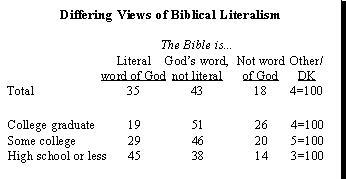Thursday, August 31, 2006
Taxing Polls
 You may have seen reports about the latest national survey by the Pew Research Center for the People & the Press and the Pew Forum on Religion & Public Life. The big news to come out of it was that, asked whether conservative Christians have gone too far in trying to impose their religious values on the country, 49% of the respondents said "yes."
You may have seen reports about the latest national survey by the Pew Research Center for the People & the Press and the Pew Forum on Religion & Public Life. The big news to come out of it was that, asked whether conservative Christians have gone too far in trying to impose their religious values on the country, 49% of the respondents said "yes." .
While definitely a good thing, it hardly amounts to a major shift, up only 4 percentage points from last year in a poll with a 2.5 percentage point margin of error. Perhaps more importantly, the split is a stark one, with 43% answering "no" and only 8% "don't know." This would appear to be only a small shift in the lines in the culture war until you realize that 60% of Democrats and 65% of Independents think liberals have gone too far in keeping religion out of government. In fact, it may only be a brief pause in the total retreat of those who think the government is screwed up enough without theological help.
True to my nature, some of the less conspicuous results leapt out at me. For example, why do nearly half (48%) of people identified as "seculars" view the U.S. as a Christian nation?
And is there anything other than the obvious to be made about this:
While definitely a good thing, it hardly amounts to a major shift, up only 4 percentage points from last year in a poll with a 2.5 percentage point margin of error. Perhaps more importantly, the split is a stark one, with 43% answering "no" and only 8% "don't know." This would appear to be only a small shift in the lines in the culture war until you realize that 60% of Democrats and 65% of Independents think liberals have gone too far in keeping religion out of government. In fact, it may only be a brief pause in the total retreat of those who think the government is screwed up enough without theological help.
True to my nature, some of the less conspicuous results leapt out at me. For example, why do nearly half (48%) of people identified as "seculars" view the U.S. as a Christian nation?
And is there anything other than the obvious to be made about this:

What's the saying? Bend over and kiss your . . . .



